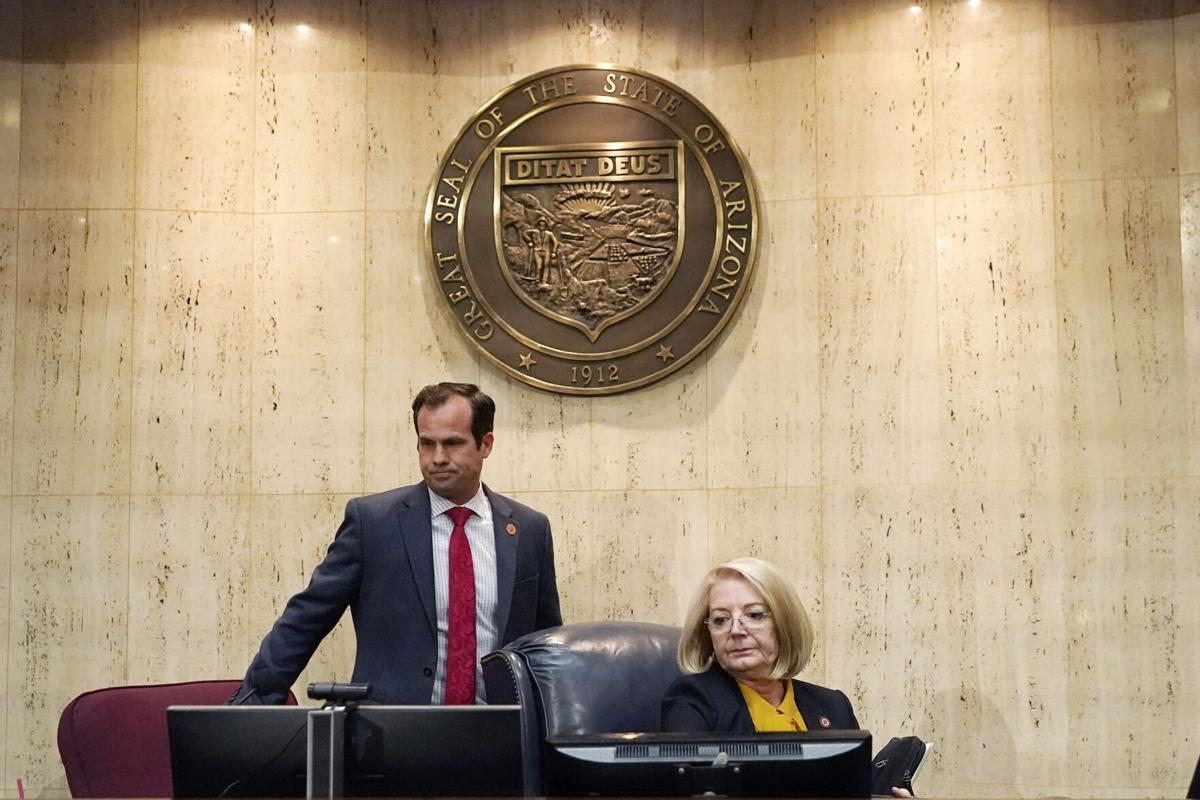PHOENIX — A judge rejected broad claims by the Senate that it need not disclose various documents related to its audit of the 2020 election.
In a sometimes strongly worded opinion late Thursday, Maricopa County Superior Court Judge Michael Kemp chided the Senate for withholding virtually every communication among Senate President Karen Fann; Sen. Warren Petersen, who chairs the Judiciary Committee; and Ken Bennett and Randy Pullen, who served as liaisons with Cyber Ninjas, the firm Fann hired to conduct the audit.
It is the second time this week that a judge has ruled against the Senate on the issue. Maricopa County Superior Court Judge John Hannah, hearing a separate lawsuit, said Tuesday he would not accept the arguments by Fann that he should just accept the Senate’s assertions the documents at issue are protected by “legislative privilege.’’
The Senate claims that “legislative privilege’’ shields communications with anyone associated with Cyber Ninjas and the companies it hired.
“Senate defendants’ position is clearly overbroad,’’ Kemp wrote.
He said the interest of the public at large “substantially outweighs’’ any interest the Senate has in keeping the information secret.
That is even more important, the judge said, given the issues at stake here.
“It is hard to imagine more serious litigation than the disclosure of documents underlying an audit of the election of the president of the United States and a United States senator in Maricopa County,’’ Kemp wrote.
He said claims by Fann that the results of the audit might be used at some point in the future to make changes in election law does not allow her and the Senate to keep underlying documents and communications away from the public.
“The audit challenges whether there was an election free of fraud, corruption or incompetence,’’ the judge said. “The stakes could not be higher and transparency, which is at the heart of the public records law, substantially outweighs any concern regarding chilling future legislative deliberations.’’
The judge said another point also convinces him that the approximately 1,000 documents at issue need to be made public.
He pointed out that the Senate chose to make public a three-volume report on the findings of Cyber Ninjas and other consultants.
That report claimed that the hand count of ballots conducted in the audit was virtually identical to the official tally that showed Joe Biden defeating Donald Trump in the state’s largest county. But it also included claims of things like missing ballots, duplicate counting of votes and missing signatures on early ballot envelopes.
Maricopa County election officials produced a report that disputed the findings and explained the apparent discrepancies, saying that Cyber Ninjas, which has never done an audit before, clearly did not understand Arizona election laws.
All that is relevant here, the judge said, as voters attempt to reach their own conclusions.
“The public has a right to know the basis for these conclusions and findings and to challenge and scrutinize those findings,’’ Kemp said.
“The public has a right to know how the audit was done, who paid for it and how much was paid,’’ he continued. “The public also has a right to know the identity of any political organizations who financed the audit.’’
That is relevant because even Cyber Ninjas CEO Doug Logan acknowledged that the $150,000 Senate contract did not begin to cover his costs.
He released a list of organizations that provided another $5.8 million, most of them with ties to Trump or his allies. But Logan would not detail who contributed to those organizations.
Kemp said there’s another reason the Senate can’t claim the documents are protected by legislative privilege. He cited not just the release of the report and its conclusions and concerns over the election results but also what he said was billed as a “public hearing’’ on the Senate floor where the consultants outlined their findings and conclusions.
The judge said that effectively waived any claim of legislative privilege.
“It is akin to a defendant testifying in a criminal trial and asserting his Fifth Amendment rights by answering only the questions he wants to answer,’’ Kemp said.
“He can’t have it both ways,’’ the judge said. “He either answers all questions or his testimony is stricken.”
That, Kemp said, is pretty much what the Senate and the individual senators are trying to claim.
“Senate defendants cannot publicly release numerous public statements about the audit, release a comprehensive report about the audit, and then refuse to disclose documents and communications that are central and integral to the findings and conclusions of that report,’’ the judge said.
The same is true, he said, of public statements made by Cyber Ninjas about the audit, “many of them directly challenged by the Maricopa County Board of Supervisors and the Maricopa County Recorder.’’
“The public has a right to scrutinize these statements by comparing them to documents and communications underlying the final report and its findings and conclusions,’’ Kemp said.
Moreover, he said, “the ‘hearing’ in the Senate chambers on Sept. 24 was much more akin to a press conference.
“This clearly was not a traditional legislative proceeding. Witnesses were not sworn and questioned, there was no debate or deliberating, and the two Senate defendants (Fann and Petersen) were the only legislators formally present.’’
All that, he said, makes it “a political act and not a legislative act.’’ That’s crucial because Kemp said political acts are not covered by legislative immunity any more than when lawmakers make speeches outside the Capitol or issue press releases.
Kemp has set a hearing for Nov. 2 to hear what the Senate has disclosed as well as consider whether Fann or others should be held in contempt for failing to surrender the documents first sought by American Oversight, a self-proclaimed nonpartisan watchdog organization.
There was no immediate comment Thursday night from Fann.





